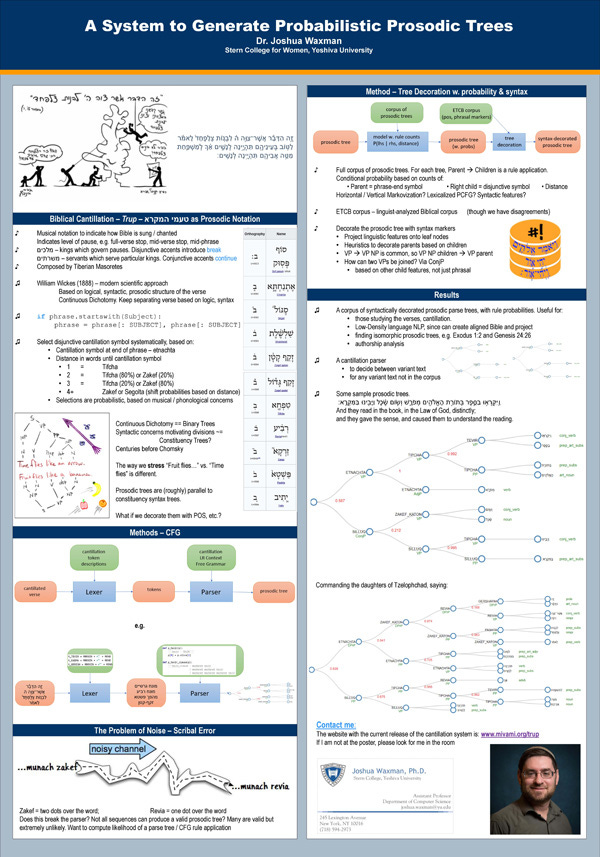Scribal Roundup #4
(1) From last week, but making the rounds a few years back.
I used this image back in 2019 to illustrate my ISCOL poster on my trup processing system:
(2) An interesting Facebook post by Shoshana Zucker, exploring the Gender-Sensitive JPS Torah’s translation.
In Numbers 30:3, the NJPS gender sensitive translation (as it appears on Sefaria), translates איש "householder" and the footnote explains "an individual whose vows are not subject to another’s review—unlike the vows made by dependent men within his household, and unlike those made by his wife or daughter. Or more vaguely, 'anyone.'"
However, I don't see anything in the text of the Torah that indicates that a father or male head-of-house could nullify the vows of an unmarried son or other dependent but free, adult male.
The definition of איש in the accompanying Dictionary of Gender in the Torah doesn't help (on the assumption that I understand, which is far from certain).
Does the Torah, written or oral, anywhere allow a more senior male to annul the vow of an adult, dependent male in his household? (Not interested here in the powers of a Beit Din).
The word "householder" seems to imply a level socio-economic standing that includes home/land ownership, e.g., not a tenant farmer. Again I see nothing in the text that would prevent an impoverished husband from annulling his wife's vow. Am I reading too much into "householder"?
Then:
Update: A little internet searching led me to an e-mail address for the editor of the gender sensitive translation. I wrote a carefully worded e-mail asking for more support for his choice. He admitted it was one of the more difficult instances of איש and sent me some of his research notes. A day later, he wrote back that -- thanks to the question -- he was reconsidering the translation and it will likely be changed in the next printing.
Here is the gender-sensitive version on Sefaria:
And here is Dr. Harry Orlinsky’s earlier JPS version, which was also motivated by gender-sensitivity.
(3) Shared on Facebook, Rabbanit Yemima Mizrachi discussing a neo-midrash, which doesn’t seem to be a midrash Chazal at all. Moshe taking the shivrei luchot and turning it into a ring to remarry Tzipporah.
Though some commenters trace elements of it.
(4) This tweet, about an “interesting” use of sefer yetzira mentioned in Sefer Shemirat HaLashon.
I wonder at the square brackets, and whether this means this is a gloss (despite being in the Hebrew). But it is an interesting idea, and a fascinating follow-up to the other midrash of ever min hachai, other midrashim about using Sefer Yetzira to make a calf to eat and the halachic status thereof. Also, as people discuss golems in context of Artificial Intelligence and ChatGPT (e.g. can you count a golem for a minyan?), it would make a late aggadic precedent for discussing the ethics of creating a sex bot. However, someone else (Yabloner Chasid @YablonHQ )commented there:
They were speaking to the golem, according to the shelah, who is the proponent of this rather interesting explanation, not engaging in any illicit act per say.
(5) This post on Scribal Error last week, about tracking a specific unjustified assertion about Reish Lakish on Wikipedia.
Reish Lakish on Wikipedia
In yesterday’s post, I posted about Rabbi Shimon ben Lakish as a gladiator. Not everyone maintains this is the case. The gemara in Gittin says he sold himself to the לודאי, which traditionally means “cannibals” (Rashi, Aruch) but is understood by more modern scholars to be “gladiators”.
To my mind, this demonstrates why you have to actually track down and read Wikipedia’s sources, to see if they justify the claims, and also to inspect the edit history. Yes, Hebrew Wikipedia for this topic is much better.
(6) A quick thought from yesterday’s daf (Gittin 62a), there was an exchange involving Geneiva or Geniva. The story begins with Rav Huna and Rav Chisda insulting him behind his back for being contentious. He shows them great respect in greeting them, and they engage in a halachic discussion about greetings. At the end:
אָמְרִי לֵיהּ: לִיטְעוֹם מָר מִידֵּי. אֲמַר לְהוּ: הָכִי אָמַר רַב יְהוּדָה אָמַר רַב: אָסוּר לוֹ לְאָדָם שֶׁיִּטְעוֹם כְּלוּם עַד שֶׁיִּתֵּן מַאֲכָל לִבְהֶמְתּוֹ, שֶׁנֶּאֱמַר: ״וְנָתַתִּי עֵשֶׂב בְּשָׂדְךָ לִבְהֶמְתֶּךָ״, וַהֲדַר: ״וְאָכַלְתָּ וְשָׂבָעְתָּ״.
Rav Huna and Rav Ḥisda said to Geneiva: Does the Master wish to taste something? Geneiva said to them: So says Rav Yehuda that Rav says: It is prohibited for a person to taste anything until he gives food to his animal, as it is stated in the verse: “And I will give grass in the field for your animals” (Deuteronomy 11:15), and only afterward is it written in that verse: “And you shall eat and be satisfied.” I have yet to feed my animal, so I may not eat.
I would suggest that Geneiva is being clever and biting in his response, and is suggesting that they are not really honoring him by calling him Mar and asking him to taste something. Rather, they regard him as an animal, and that is why they offer him food.










